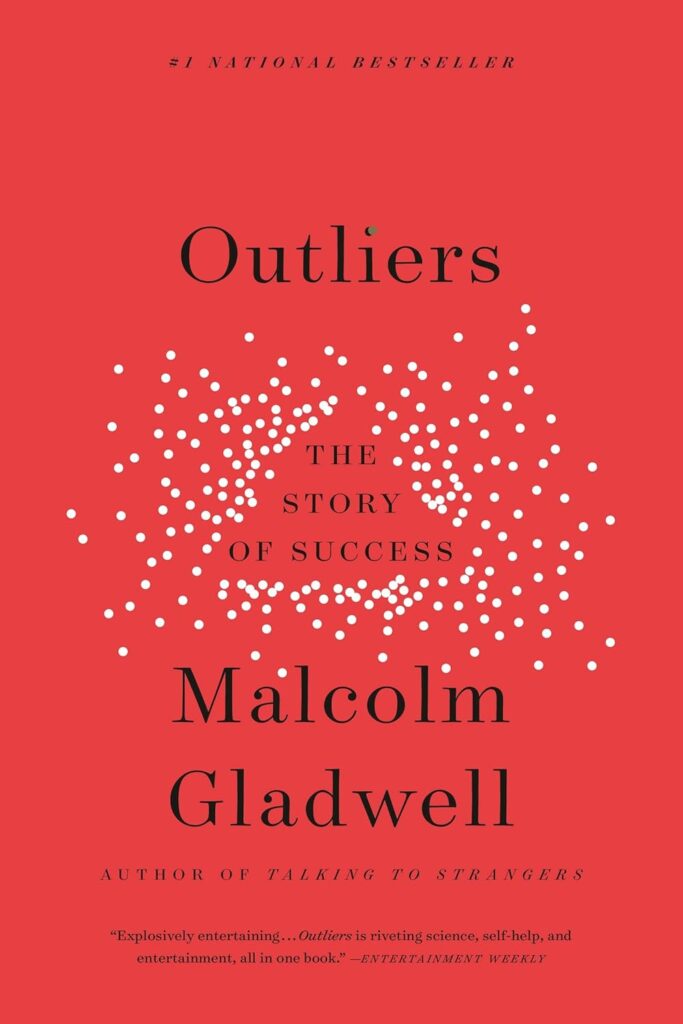I have to admit, when I first picked up Malcolm Gladwell’s Outliers: The Story of Success, I was skeptical. Another book about success? I thought I’d heard it all before—work hard, stay focused, and you’ll make it big. But Gladwell’s take on success is anything but ordinary. This book doesn’t just offer advice; it turns everything you think you know about success upside down. If you’re ready to dive into a world where luck, timing, culture, and hard work all play a role in extraordinary success, then stick with me as we explore the fascinating insights from Outliers.
1. The 10,000-Hour Rule: Practice, Practice, Practice
One of the first concepts that grabbed my attention in Outliers is the famous 10,000-hour rule. Gladwell argues that to achieve mastery in any field, you need to put in about 10,000 hours of practice. Now, that might sound daunting, but let me tell you—it’s incredibly freeing. Why? Because it shows that success isn’t just about raw talent. It’s about persistence, dedication, and, quite frankly, a lot of hard work.
I remember reading about The Beatles and how they performed live in Hamburg, Germany, for over 10,000 hours before they became the global phenomenon we know today. It wasn’t just their talent that propelled them to fame; it was the countless hours they spent perfecting their craft. And this doesn’t just apply to music. Gladwell mentions Bill Gates, who spent thousands of hours programming as a teenager before launching Microsoft. It’s a powerful reminder that there’s no shortcut to success—you have to put in the work.
But here’s the thing: Gladwell also emphasizes that those 10,000 hours are often made possible by a series of fortunate events. Gates had access to a computer at a time when most people didn’t, and The Beatles had the opportunity to play for hours on end in Hamburg. So, while hard work is essential, luck and timing are also key ingredients.

2. The Role of Timing: Born at the Right Time
Have you ever wondered why some people seem to be in the right place at the right time? Gladwell delves into this idea in the second section of Outliers, and it blew my mind. He explains that being born in the right era or even the right month can significantly impact your chances of success.
Take the example of Canadian hockey players. Gladwell points out that a disproportionate number of professional players are born in the first few months of the year. Why? Because the cutoff date for age-class hockey in Canada is January 1st. This means that kids born in January are often bigger and more physically developed than those born later in the year. As a result, they get more attention, better coaching, and more opportunities to excel.
It’s a bit unsettling to think that something as arbitrary as your birth month can affect your future, but it makes sense. Gladwell doesn’t just leave it at that, though. He digs deeper into the lives of successful people like Bill Gates, Steve Jobs, and even the founders of Silicon Valley. He shows that many of them were born in the mid-1950s, just as the computer revolution was taking off. They were at the perfect age to take advantage of this technological boom, and it played a crucial role in their success.
This part of the book made me reflect on my own life. I started to think about the opportunities I’ve had and how timing has played a role in where I am today. It’s not something we often think about, but Gladwell’s insights make it clear that success is often about more than just hard work—it’s also about being in the right place at the right time.
3. Cultural Legacy: The Invisible Hand of History
One of the most surprising sections of Outliers is when Gladwell explores the concept of cultural legacy. He argues that the culture we’re born into can shape our behavior and influence our success in ways we might not even realize.
Gladwell gives the example of Korean Air, which had a terrible safety record in the 1980s and 1990s. At first, it seemed like a series of unfortunate accidents, but Gladwell digs deeper and discovers that the problem was rooted in Korean culture. In Korean society, there’s a strong emphasis on hierarchy and respect for authority. This cultural norm seeped into the cockpit, where co-pilots were hesitant to challenge the captain’s decisions, even when they noticed something was wrong. The result? A string of avoidable crashes.
It wasn’t until Korean Air acknowledged this cultural issue and implemented changes—like encouraging open communication in the cockpit—that their safety record improved. This story made me realize how deeply our cultural backgrounds can affect our behavior and decisions, even in situations where we might not expect it.
Gladwell also touches on how cultural legacies can work in our favor. For instance, he talks about how certain cultural traits, like hard work and persistence, can be passed down through generations and contribute to success. The story of Jewish immigrants in New York who became successful garment industry entrepreneurs is a perfect example. Their cultural legacy of hard work and craftsmanship, combined with the opportunities available in America, led to remarkable success.
Reading this section made me think about my own cultural background and how it has shaped my life. It’s fascinating to consider how much of who we are—and what we achieve—is influenced by the invisible hand of history and culture.
4. The Power of Opportunity: The Hidden Factors Behind Success
One of the most compelling arguments in Outliers is that success isn’t just about individual effort; it’s also about the opportunities we’re given. Gladwell introduces us to the idea that even the most successful people wouldn’t be where they are without a series of opportunities that allowed them to thrive.
He talks about how seemingly small advantages can snowball into significant success. Take, for example, the story of Joe Flom, a lawyer who rose to prominence in the 1970s. Flom wasn’t born into a wealthy family, nor did he attend an Ivy League school. But he was born at a time when the legal profession was undergoing a transformation. His timing was perfect, and he seized the opportunity to specialize in a niche area of law that others were ignoring. That opportunity, combined with his hard work, led him to become one of the most successful lawyers in America.
What struck me about this part of the book was how Gladwell makes it clear that we often overlook the role of opportunity in success. We love the idea of the self-made man or woman, but the truth is, no one succeeds entirely on their own. There’s always a teacher, a mentor, a supportive community, or a stroke of luck that plays a role.
Reflecting on my own life, I can see how opportunities—big and small—have shaped my journey. And it’s not just about recognizing the opportunities you’ve had, but also about being open to new ones and seizing them when they come your way. It’s a powerful reminder that while hard work is essential, being aware of and taking advantage of opportunities is just as important.
5. Redefining Success: What Outliers Teaches Us About Achievement
As I reached the end of Outliers, I realized that this book isn’t just about success—it’s about redefining what success really means. Gladwell challenges the conventional notion that success is solely the result of individual talent and effort. Instead, he paints a picture of success as a complex interplay of factors, including hard work, timing, culture, and opportunity.
This perspective was eye-opening for me. It made me think about how we often measure success by looking at the end result without considering the journey. We see the success, but we don’t always see the 10,000 hours of practice, the timing, the cultural influences, or the opportunities that made it possible.
Outliers teaches us that success is rarely a solo endeavor. It’s a product of our environment, the people around us, and the circumstances we find ourselves in. And while this might make success seem more elusive, it also makes it more attainable. It means that we can seek out opportunities, cultivate our environment, and leverage our cultural background to our advantage.
So, what does this mean for you and me? It means that while hard work and talent are crucial, they’re not the whole story. It’s about being aware of the factors that contribute to success and using them to our advantage. And perhaps most importantly, it’s about recognizing that success isn’t just about individual achievement—it’s about the collective journey.
Conclusion: How Will You Define Your Success?
So there you have it—Outliers in a nutshell. It’s a book that doesn’t just tell you how to succeed; it changes the way you think about success altogether. Gladwell’s insights are a powerful reminder that success is a multifaceted concept, shaped by a combination of hard work, timing, culture, and opportunity.
As I close this chapter on Outliers, I’m left with one burning question: How will you define your success? Will you focus solely on individual effort, or will you take a broader view and consider the many factors that contribute to achievement? The choice is yours, and I’m curious to see how you’ll shape your own story of success. What’s your next move?




